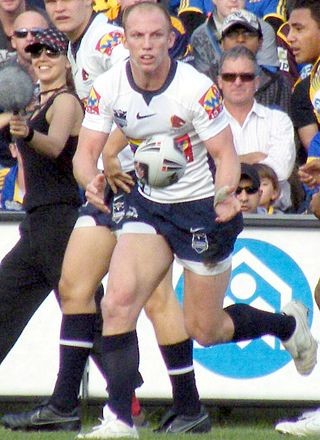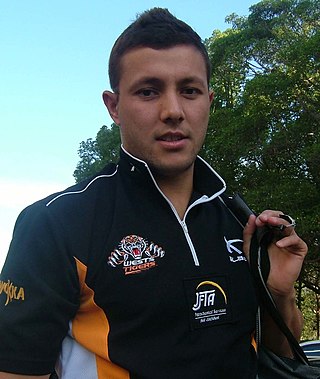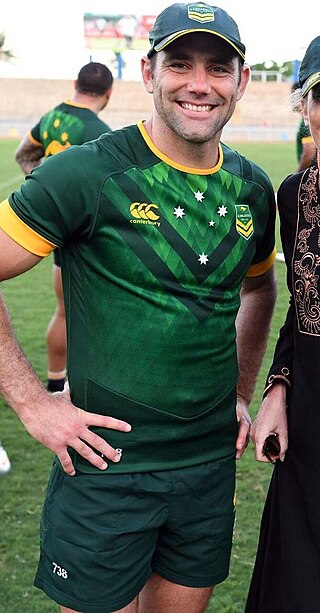Game III
Justin Hodges was ruled out of the Queensland side for game III after he re-tore his hamstring [8] and was replaced by Josh Hannay. Steven Bell was also ruled out after he sustained a fractured cheekbone in game II. [9]
After the heavy loss in game II the New South Wales selectors made five changes, bringing in Matt Cooper, Paul Gallen, Craig Gower, Luke O'Donnell and Ben Hornby as well as moving Matt King into the centres, Mark Gasnier to five-eighth and Luke Bailey into the starting side.
Wednesday, 5 July 2006 [10] |
Game III was held at Telstra Dome, Melbourne, and was the first decider played at a neutral venue. [12] Queensland were trailing 14-4 with ten minutes remaining, however scored two converted tries in the space of five minutes – first Brent Tate's long-range try after a line break from Thurston and then Lockyer intercepting a Hodgson pass inside New South Wales' own half – to take the match and series, winning 16-14.

Darren James Lockyer is an Australian television commentator and former professional rugby league footballer. Lockyer was an Australian international and Queensland State representative captain, who played his entire professional career with the Brisbane Broncos.

Scott Prince is an Australian former professional rugby league footballer who played as a halfback in the 1990s, 2000s and 2010s.

The Queensland rugby league team represents the Australian state of Queensland in rugby league football. Nicknamed the "Maroons" after the colour of their jersey, they play three times a year against arch-rivals New South Wales in the State of Origin series. The team is currently coached by Billy Slater and captained by Daly Cherry-Evans, and is administered by the Queensland Rugby League. They play all of their home matches at Brisbane's Lang Park.

Petero Civoniceva, is a Fijian-Australian former professional rugby league footballer who played in the 1990s, 2000s and 2010s. A Queensland State of Origin and Australian international representative prop forward, in 2009 he broke the record for most international matches for Australia of any forward in history. Civoniceva played his club football for the Brisbane Broncos, with whom he won the 1998, 2000 and 2006 NRL Premierships, as well as for the Penrith Panthers, whom he captained. Late in his career whilst playing for the Redcliffe Dolphins in the Queensland Cup, Civoniceva captained the Fiji national team in their 2013 Rugby League World Cup campaign. The Petero Civoniceva Medal is awarded to the Australian Fijian rugby league footballer of the year, while the Civoniceva Medal is awarded to the Queensland Cup player voted as the best and fairest.

Cameron Wayne Smith is an Australian former professional rugby league footballer who played as a hooker, spending his entire career with the Melbourne Storm in the National Rugby League (NRL). He has also been an assistant coach of the Queensland rugby league team under former Melbourne teammate Billy Slater since 2022.
The 2007 State of Origin series was the 26th year that the annual best-of-three series of interstate rugby league football matches between the Queensland and New South Wales representative teams was contested entirely under 'state of origin' selection rules. Queensland won the series by winning the first two games. New South Wales avoided the whitewash by winning the third match held at Suncorp Stadium. The Wally Lewis Medal for player of the series was awarded to Queensland's hooker, Cameron Smith.
Paul Gregory Green was an Australian professional rugby league football coach, best known for taking the North Queensland Cowboys to the NRL premiership in 2015, and a professional rugby league footballer who played in the 1990s and 2000s.
The 2005 State of Origin series saw the 24th time that the annual three-game series between the Queensland and New South Wales representative rugby league football teams was contested entirely under 'state of origin' selection rules. The three matches drew a total attendance of 187,309 and New South Wales won the series 2-1, their third consecutive series victory, and their last until 2014.
The 1980 State of Origin game was the first game between the Queensland Maroons and the New South Wales Blues rugby league teams to be played under "state of origin" selection rules. It was the third match of 1980s annual interstate series between the Blues and the Maroons, and was only allowed to go ahead because the first two matches were already won by New South Wales under established 'state of residency' rules. It was played on 8 July 1980 under the newly configured rules by which a player would represent his "state of origin", i.e. the state in which he was born or in which he started playing registered first grade rugby league football.
The 2004 State of Origin series was the 23rd time that the annual three-game series between the Queensland and New South Wales representative rugby league football teams was contested entirely under 'state of origin' selection rules.
The 2003 State of Origin series was the 22nd year that the annual three-game series between Queensland and New South Wales was contested entirely under 'state of origin' selection rules. Queensland's return to a renovated Lang Park was soured when Andrew Johns returned to form for New South Wales in devastating fashion.
The 1991 State of Origin series saw the tenth time the annual three-match State of Origin series between the New South Wales and Queensland representative rugby league teams was played entirely under 'state of origin' selection rules. It was notable as Wally Lewis' farewell from Origin football and featured his half-time stoush with Mark Geyer in Game II which match culminated in Michael O'Connor's sensational match-winning sideline conversion in teeming rain.
The 1986 State of Origin series was the fifth year that the annual three-match series between New South Wales and Queensland was contested entirely under "state of origin" selection rules. It was the year that New South Wales finally asserted some dominance and won the series in the first ever 3-0 Origin whitewash. It was an inauspicious introduction to Origin coaching for Wayne Bennett who soon afterwards began plotting a reversal of fortunes that would lead to a pending period of Queensland dominance.
The 1984 State of Origin series was the third time the annual three-game series between the representative rugby league football teams of New South Wales and Queensland was played entirely under "state of origin" selection rules. With Queensland wrapping up the series in the first two matches it produced the first dead rubber finish and an infamous opening minute brawl in game II.
The 2008 State of Origin series was the 27th year that the annual best-of-three series of interstate rugby league football matches between the Queensland and New South Wales representative teams was contested entirely under 'state of origin' selection rules. At its commencement each side had won twelve Origin series with two series drawn.
The 1982 State of Origin series was the first annual three-match series for rugby league between New South Wales and Queensland to be played entirely under "state of origin" selection rules. After the matches in 1980 and 1981 that trialed the concept, 'Origin' was fully embraced in 1982, with no matches using the previous seventy-four years' residential-based selection rules ever played again.
The 1983 State of Origin series was the second time the annual three-game series between the New South Wales and Queensland rugby league teams was played entirely under "state of origin" selection rules.

The 2009 State of Origin series was the 28th time that the annual three-game series between the Queensland and New South Wales representative rugby league football teams was played entirely under 'state of origin' selection rules. Queensland won their first two matches to retain the shield and to record 14 series wins, as well as the first time in Origin history that a state had won the series for four consecutive years. Maroon centre Greg Inglis was awarded the Wally Lewis Medal as player of the series.
The 2010 State of Origin series was the 29th annual best-of-three series of interstate rugby league football matches between the Queensland and New South Wales representative teams played entirely under 'state of origin' selection rules. For the second year in a row, a Queensland victory set a new record for consecutive State of Origin titles, reaching five. Queensland won all three matches, completing their first series white-wash since 1995.
The 2011 State of Origin series was the 30th annual best-of-three series of interstate rugby league football matches between the Queensland and New South Wales representative teams contested under "State of Origin" selection rules. For the third successive year a Queensland victory set a new record for consecutive State of Origin titles, reaching six. Game I was played in Brisbane, Game II in Sydney and Game III was again played in Brisbane. Game III was also Australia's most watched sports TV programme for the year 2011.





